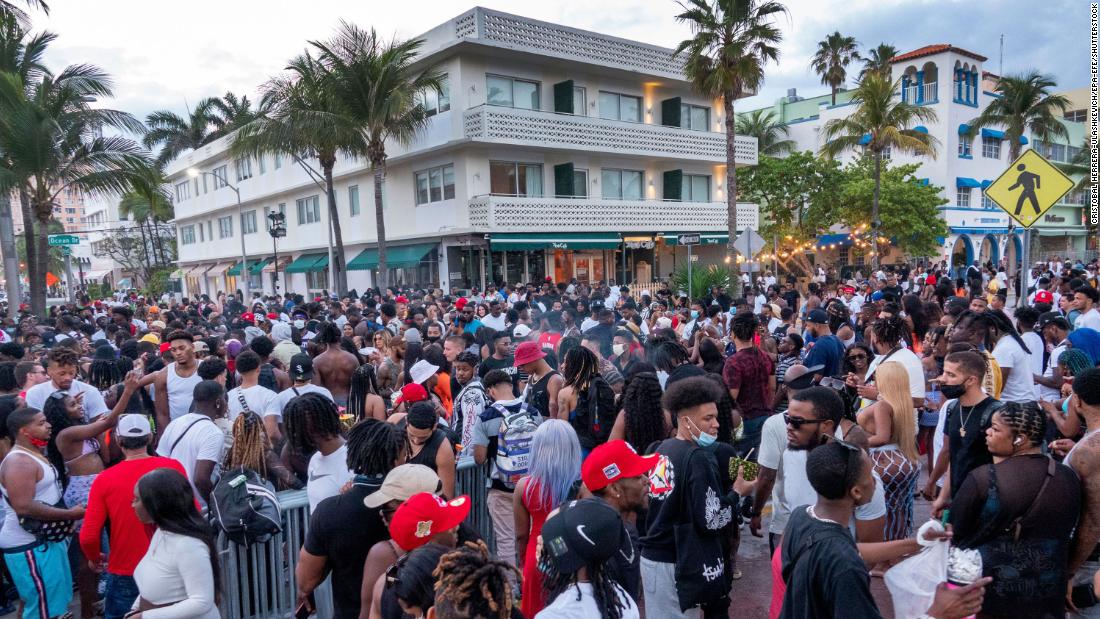
“I don’t see anyone taking any precautions,” Pena, 32, told CNN. “No one wears masks, no one socially distances themselves.”
Images from the South Florida spring holiday season offer little indication that a deadly virus continues to spread across the country. Last week, there were an average of about 54,600 new cases and more than 1,000 virus-related deaths each day in the U.S., according to data from Johns Hopkins University.
“You see those images of people crowded into bars, for example, mostly indoors, without masks, basically without physical distances,” said Cindy Prins, an epidemiologist at the University of Florida. “This simply creates a sadly ideal situation for Covid’s transmission.”
And crowds show few signs of shrinking, with the Miami Beach police chief saying visitors have multiplied in recent weeks, and the trend will continue through April.
Pena is not only worried about catching the virus. Like local officials and experts, he says he worries that crowds could cause spikes and devastation in his community and country, something he experienced first-hand when he lost his grandmother to the virus in October.
“I am afraid of more deaths, as I have witnessed and been a part of the Covid victims,” he said. “We are losing people left and right, because of negligence and disregard.”
Residents of South Florida, CNN, spoke with the same concern and added that they understand the difficult decisions of government leaders as they try to balance the desire for a healthy economy with the security of a community. But, according to several residents, they would like the state to welcome visitors in a safer way, with stricter enforcement of violators of the rules.

People are having fun on Ocean Drive on March 19, 2021 in Miami Beach, Florida
Joe Raedle / Getty Images
“It doesn’t look good”
Emily Arcia, who lives in Miami, said for months that she left home only when absolutely necessary, taking only outdoor walks with her husband on the beach and only after getting ready with masks and gloves.
Although she has been completely vaccinated, her husband has just received his first shot and going outside, especially now, puts the couple back on their nerves.
“I live right in front of the ocean, I live next to a park and it’s full,” Arcia, 66, said. “I’m not even going down on Saturdays and Sundays, because there are too many people.”
During the moments when Covid-19 cases arose in the community, he could hear the sirens of the first responders from his balcony, at a much more frequent pace than normal. It is a marker that he fears will reappear.
“I have no idea what can be done to avoid what I think will be a rebound in cases,” he said. “I hope the number of vaccines that are being provided … is somehow a balance. But, you know, it doesn’t look good.”
And not only the state can see consequences.
“It’s not just about what’s going to happen in Florida,” says emergency physician Leana Wen. “It’s about what will happen when people come back from where they came from and become asymptomatic carriers who can transmit the virus to other vulnerable people.”
According to her, returning spring breakers could fuel growth across the country.

A large crowd of people take part in a party on a catwalk near the beach, during the spring break in Miami Beach on March 20, 2021
Cristobal Herrera-Ulashkevich / EPA-EFE / Shutterstock
Local leaders fear that progress will be lost

An overview of people partying in the Elbo Room on Fort Lauderdale Beach on March 14, 2021
Larry Marano / Shutterstock
“We’ve spent a lot of time and energy and lowered all of our key indicators,” Miami Mayor Francis Suarez told CNN on Thursday. “Breakbviamente, the spring break entails a flood of tourists and they may not think as conscientiously as the people who stay here and have to deal with the repercussions later.”
Gelber, in Miami Beach, is also scared. “We have too many people coming in who want to let go unacceptably and we have a pandemic that really includes the center of the variant,” he said recently.
And experts, including Wen, have warned that as high levels of infection persist as the country works to vaccinate more Americans, the virus is more likely to continue to mutate and more worrying variants may emerge, which would not only be more transmissible, but they also pose a problem for vaccines.
“So the more community there is, the more these variants could be developed and that could push us back,” Wen said.
CNN’s Travis Caldwell contributed to this report.